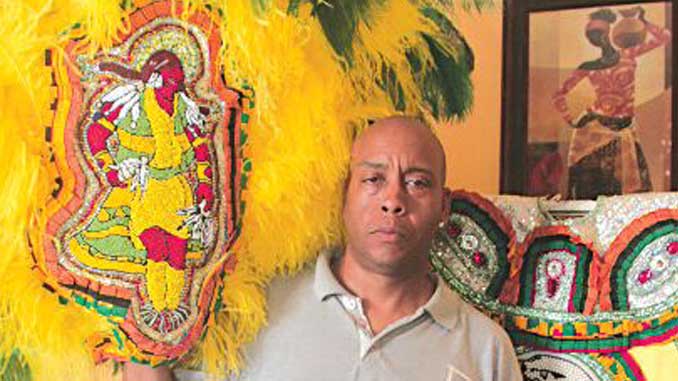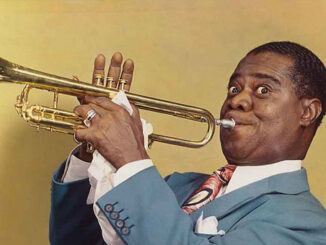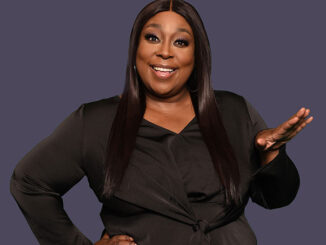
By Glenn Jones
Timeline:
1968 – 1980 Big Chief George “Jolly” Landry
1981 – 1982 Big Chief Norman Bell
1983 – 1984 Big Chief Thomas Landry
1986 – 1989 Big Chief Johnny Diggs
2000 – Present Big Chief Roderick “Bald Eagle” Sylvas
Big Chief Bald Eagle is Chief of the world renowned Wild Tchoupitoulas, brought to the streets by the legendary Big Chief George “Jolly” Landry, Uncle of the Neville Brothers. The world owes a great gratitude to this team consisting of Big Chief Jolly, Big Chief Bo Dollas of the Wild Magnolias and Big Chief Monk Boudreaux of the Golden Eagles Tribe. It’s amazing to think that all of these legends were in one tribe at one point in history. “The music of this culture has always been there” as Chief Roderick says, but these men were responsible for bringing it to the world. Like his cousin Big Chief Klik of the Young Black Seminoles, Chief Roderick is very humble and speaks sparingly about his position as Big Chief of the historic Wild Tchoupitoulas. As his tribal chief name Bald Eagle denotes, Chief Roderick soars above small talk and focuses on the big picture. He is focused on preserving Indigenous Black Masking Culture through his daughter and third Chief Justin Harris. The ritual of passing down the culture runs deeper than the Wild Tchoupitoulas. Chief Roderick is in the direct bloodline of the Choctaw of Bayou Lacombe’s native people whose bloodlines are descendants of the Washita Yamasee Moors. Simply put, descendants of the aboriginal Olmec’s of the now Americas.
This is why Big Chief is offset by the question of who he is paying homage to when he suits up? As he says “this masking thing I don’t know when that came about, and why they say we are masking, but I understand what they are saying. Because you had a blending of cultures. Everybody was not indigenous to the Americas (Turtle Island) and you had West African introduced into the area. When I say I’m standing on those ancestors, both of those ancestors influenced the music, the drums, the tambourine, the sound just the overall culture as we do things.” He continues, “It’s like a blending and this is what we have now. We’ve been doing it over 300 years. We had Indians at one time that would have a parade and amongst the havoc they would go in the French Quarter and steal stuff and cause havoc. Just a wild time for them, they would do it every year. In the 1700 hundreds leading into the 1800 hundreds.” Roderick Sylvas is not just a Big Chief he is a true to life “Culture Barrier.”
- Q) What was your experience with the Black Masking Culture?
- A) My first encounter with the culture, like I said, my uncle was Trail Chief (Charles Booker originally of Black Eagles Tribe than forming the Wild Tchoupitoulas with Big Chief Jolly), I saw the Indian suits on his bed when I went at his house but it still didn’t click in my mind what that was. I was like, Uncle Booker got a bunch of feathers and some beads and jewels on the bed. He always kept it covered up, anybody came in the house you will never see it laying on the bed. It was a secret type thing. My first time actually seeing an Indian come down the street was my uncle coming down Cadiz Street from off Tchoupitoulas. When he was coming down the street I didn’t know it was him. Like I’ve told this story before I compare that to Jesus coming into town. That’s how he would come with a bunch of people behind him beating a tambourine. They said that your Uncle Booker he’s an Indian. That whole thing inspired at the age of 6 or 7.
- Q) How do we get more community involvement in the Indian community?
- A) You’ve got some people that it just comes to them. They just automatically want to participate because it’s in their blood. You’ve got other people so wrapped up in westernized culture they can’t see nothing else. They want the same thing that Europeans have. Instead of getting your own they rather go work for somebody else. I’m really not into going to work for somebody else. I’m used to producing my own stuff, working for myself. If I can. If I can’t and I’ve just got to go out and do it, then that’s what I’ll do.
- Q) What are your thoughts on the economics of this City squeezing out this culture and the natives of this City?
- A) That’s in part the creole culture of this City. We have been struggling with this light skin, dark skin thing here in New Orleans for the longest. You’ve got people that have gotten the education, rose up to the level of City Council Member or Mayor and they haven’t reached back and helped the people in the community. They’ve just done the status quo, without addressing the concerns of the community. We’re the ones going to jail. We’re the ones that don’t have a job. So, if you don’t have jobs, they’re still going to get the money. That’s been our downfall in this City. There are too many of us living in this City, that we can’t put together our own money and get some of this economic development that’s going on. We’ve got thousands, we’ve got millions of people that come here to have a good time and we are the entertainment. Yet, we’re the lowest paid people besides the housekeepers.
- Q) What spirit do you bring or evoke when you mask?
- A) I feel a range of emotions. Sometimes, I feel humble, sometimes I feel war like. It depends on that drum beat. Sometimes, that drum beat brings you to another place. It’s just when the spirit hits you. When you put that suit on you’re gonna be a different person automatic. Whether you’re humble or not. It’s the call of the drums.
Recommended For You.






Be the first to comment